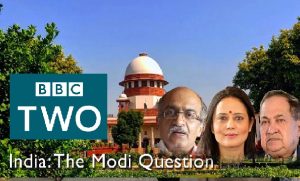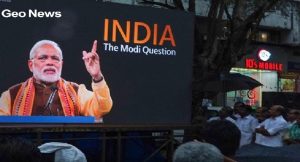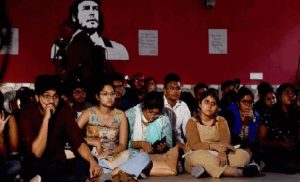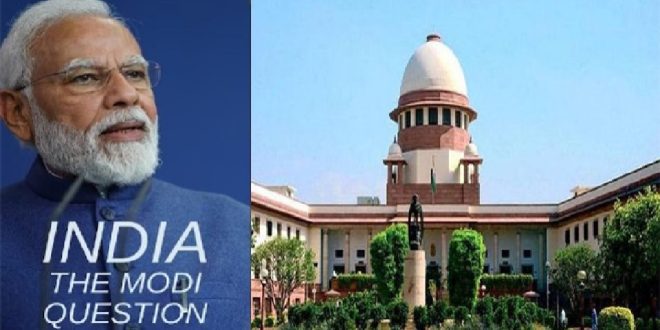11-02-2023
Bureau Report + Agencies
NEW DELHI: The public interest litigation (PIL) petition which was filed by Hindu Sena asking for a ban on the British Broadcasting Corporation was dismissed by the Supreme Court on Friday.
The Hindu Sena was seeking ban on BBC for airing the documentary named India: The Modi Question, which was based on the 2002 Gujarat riots.
A bench comprising of Justice Sanjiv Khanna and Justice MM Sundresh have said that the reason for plea to be dismissed was that it was misconceived and the Court cannot impose censorship. The bench told the Senior  Advocate Pinky Anand who represented the petitioner that the plea was completely misconceived, and it could not be argued? The bench asked how can anyone ask for complete censorship…what is this?
Advocate Pinky Anand who represented the petitioner that the plea was completely misconceived, and it could not be argued? The bench asked how can anyone ask for complete censorship…what is this?
The Counsel then requested that the petitioner should be heard. The counsel elucidated the point by saying that similar thing had happened in India’s Daughter…and it should be heard.
The court however paid no heed to the request and denied it.
The Court ordered that there should be no waste of time, as the writ plea was entirely misconceived, it had no merit…and thus dismissed.
The BBC documentary that has created the whole issue is named India: The Modi Question and deals with deals with the 2002 Gujarat riots.
The documentary examines the role of Prime Minister (PM) Narendra Modi who was then the Chief Minister of Gujarat when the riots happened.
The documentary was banned by the Central government on the social media and online channels, however it has been screened in various colleges and universities across the country.
 The petition was filed before the top court by Vishnu Gupta,had asked for putting a complete ban on BBC.
The petition was filed before the top court by Vishnu Gupta,had asked for putting a complete ban on BBC.
There have been requests for investigating the matter as it seems to divide India.
It is said that the documentary film aims at anti-Narendra Modi propaganda for tarnishing his image.
It is also alleged that this documentary is with the aim of Anti-Hinduism propaganda by the BBC to destroy the social fabric of India.
It was further alleged that the BBC has an anti-Indian stance since the time of Indian independence.
The petitioner said that they had put a representation to the Union Home Ministry on January 27 to ban the network, but no action was taken till date.
The petitioner claims that the right to free speech under Article 19(1)(a) of the Constitution is not an absolute right but is qualified by Article 19(2).
 It was the same bench which had last week asked for the response of the Central government on pleas challenging government orders for blocking the documentary.
It was the same bench which had last week asked for the response of the Central government on pleas challenging government orders for blocking the documentary.
Meanwhile, a top Indian university has banned the screening of a BBC documentary about Prime Minister Narendra Modi’s role during the deadly 2002 sectarian riots after his government attempted to block its spread online.
The broadcaster’s program alleges that the Hindu nationalist Modi, premier of Gujarat state at the time, ordered police to turn a blind eye to an orgy of violence there that left at least 1,000 people dead, most of them minority Muslims.
Students at the prestigious Jawaharlal Nehru University in New Delhi had planned to screen the documentary on Tuesday, defying efforts by Indian authorities to restrict its showing.
 Pressmediaofindia
Pressmediaofindia




